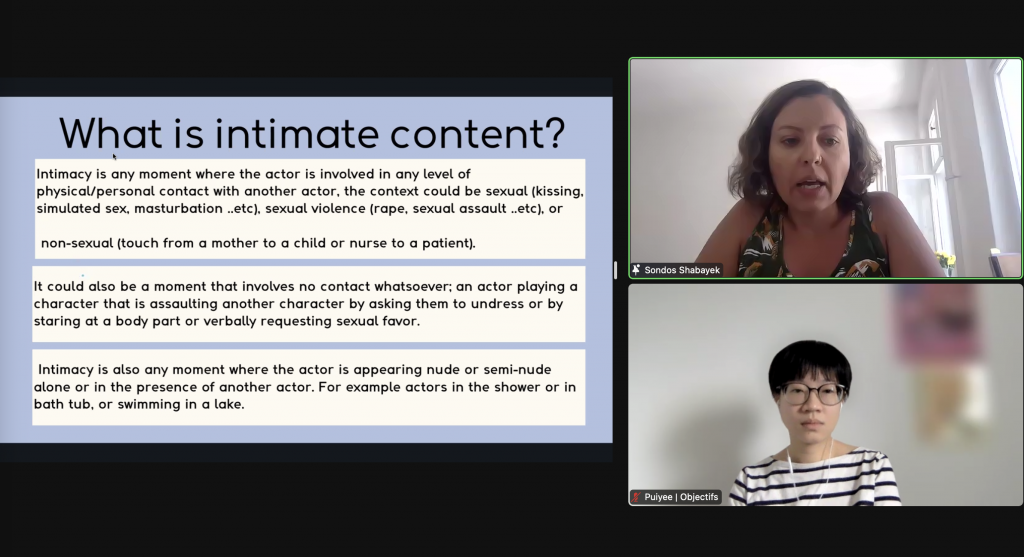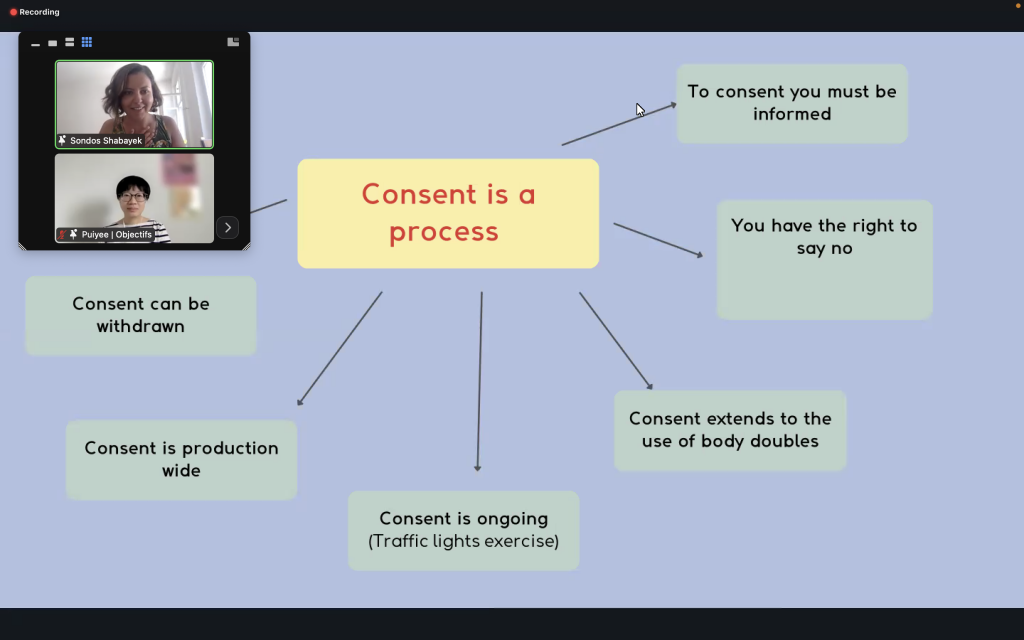By Sondos Shabayek for Objectifs Short Film Forum 2023
Familiar names in the international film industry candidly shared their perspectives in the Short Film Forum, a weekend of online talks organised as part of Objectifs Short Film Incubator 2023. In this session, intimacy co-ordinator Sondos Shabeyek spoke frankly about what her role entails, power dynamics on set, and informed consent. Read on for a recap.

What intimate content is
Citing examples of problematic treatment towards actors on set, from deception to sexual abuse, Sondos began her talk on the need for safety during shoots. As she said, “For actors to do their best, be in touch with their vulnerability, and focus on being in the present, they need to feel safe.”
The need to create safety is not only pertinent during the filming of sex scenes. It is key in other forms of sensitive content that may not be sexual or involve physical contact too, such as assault and verbal harassment.
The nuances of different cultural contexts have to be considered as well. As Sondos explained, “If we are in the Middle East and you are shooting a scene with female actresses wearing revealing dresses and playing the role of sex workers, I would consider that intimate content. Why? Because you are asking actors to wear something that they normally would not wear on the street.”

The role of an intimacy coordinator
One responsibility an intimacy coordinator has is to ensure that the crew feels safe – physically, psychologically, and emotionally – during production. To perform their role, an intimacy coordinator is equipped with different tools. Conflict resolution strategies and mental health first aid skills, for example, are in Sondos’ kitbag.
Due to power dynamics on set, it is crucial that an intimacy coordinator is independent of the production crew. Certain roles hold more power than others – a producer for instance, has the authority to hire or fire. A director has the influence to shape the career of an actor. Such dynamics limit the ability of people whom they have control over to freely express themselves. By providing them with this independence, an intimacy coordinator would be better placed to undertake certain tasks, such as making sure that actors’ consent has been given for intimate scenes.
Consent as a process
When acquiring consent, intimacy coordinators make sure that relevant parties are fully aware of what they are consenting to. As Sondos elaborated, “Consent has to be informed. That is, I can’t just ask actors if they consent to kissing in a scene. They need to know what kind of kiss, how long the kiss is, the duration of the shoot, and more. They need to understand what I am asking them to consent to. And they need to have the right to say no.”
Such consent also extends to issues such as the use of body doubles, the degree of nudity, and the quality of touch. It also relates to the use of modesty wear, which are garments designed to cover genitals, breasts, and other body parts not intended to be filmed.
Seeing consent as something that is “ongoing”, an intimacy coordinator routinely checks in with actors during various stages of production, from rehearsals to filming. In some countries, actors also have to “approve the final cut of the film”.
When working with actors who are minors, intimacy coordinators have to get the consent of their guardians instead. “The most important thing to know,” as Sondos mentioned, “is that minors need to leave the set feeling good.”

Communication with the crew
Besides actors, an intimacy coordinator works with people from different departments on set. For instance, they may communicate with those from the sound department to understand where a mic would be attached to an actor. They may also liaise with workers in the props department when it comes to genital prosthetics.
Communication with directors is key to the job of an intimacy coordinator. As Sondos quipped, “I need to know what vision he has for a scene. Where is the camera going to be? Does he have a specific reference? Is he open to suggestions? These are questions that an intimacy coordinator needs to ask a director.”
When communicating with directors, it is helpful to ensure that directors do not feel threatened. As Sondos joked, intimacy coordinators are not “the harassment police”. Rather, while intimacy coordinators work to ensure safety on set, they also strive to support the artistic vision of a director. Framing the job of an intimacy coordinator in this manner paves the way for a smoother working relationship.
Given the myriad responsibilities of an assistant director, Sondos also gave those keen to become intimacy coordinators a piece of advice: “Make the assistant director your best friend. Always.”

Choreography of intimate scenes
After understanding a director’s vision for a scene, an intimacy coordinator may make proposals to facilitate it. As Sondos elaborated, “We divide a scene into specific beats and we go through the details mechanically, like what is to happen in sequence. We then choreograph based on our understanding of the story and beats. To do that, we use acting exercises that are not just to do with consent, but also regarding chemistry. We also use exercises regarding how actors can move, like to get into positions where it seems that they are kissing but are actually not.”
Sondos added, “It’s very important to highlight that my role as an intimacy coordinator is to simulate meaning.”
When choreographing a scene, Sondos stressed the importance of using language that is respectful. Body parts are to be called by their proper names, such as breasts, instead of ‘tits’, and penis, instead of ‘cock’.
At the end of a shoot, intimacy coordinators also help actors to ‘de-role’ through various exercises. Assisting actors in getting out of their characters is especially crucial for scenes related to sexual violence. As Sondos explained, “You don’t want actors to walk out feeling vulnerable. You don’t want them to leave feeling bruised in any way. This is what we call closure and ‘de-role’. One of the easiest exercises to do that is to get actors to start shaking. When you start shaking your body, you are actually releasing a lot of tension and stress.”
Recap by Ng Hui Hsien, Aug 2023.

